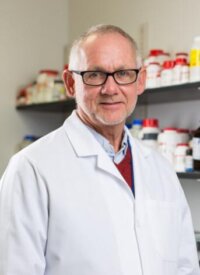
Charles P. France, PhD, the Robert A. Welch Distinguished University Chair in Chemistry, professor of pharmacology and professor of psychiatry in the Joe R. and Teresa Lozano Long School of Medicine at The University of Texas Health Science Center at San Antonio (UT Health San Antonio), recently received a $4.12 million award from the U.S. National Institutes of Health (NIH) to investigate innovative drug development research of the compound methocinnamox (MCAM) to help combat the opioid epidemic.
This NIH funding mechanism, specifically UG3/UH3, has one precise objective to advance the discovery into the clinical setting. “We want to get this into the clinic,” France said. “The opioid epidemic worsened significantly during the COVID-19 pandemic and there are people dying every day from an opioid overdose. And this drug, we believe, will impact human health.”
The drug under investigation “will work to both rescue people from opioid overuse and prevent relapse, but in a much more effective manner than either of the drugs that are currently available, naloxone and naltrexone,” France continued. “These grants are slightly different from many of the grants I have in my laboratory because it specifically targets advancing medicine to the clinical setting. Under the best of conditions, we hope to have this compound into a phase one clinical trial sometime in 2024.”
For more than 40 years, France’s laboratory has studied substance use disorders, predominantly supported by the National Institute on Drug Abuse and NIH grants, as well as collaborations with various pharmaceutical and biotechnical companies.
“If one were reversing opioid overdose with naloxone, for example, its duration of effectiveness is about an hour. People will often need another dose of naloxone to be adequately rescued. Otherwise, renarconization occurs,” France said. “Our drug lasts for a couple of weeks, so if you were to save somebody today with that drug, they would be protected from opioid overdose going forward. And some populations are at very high risk for overdose. Someone rescued from an opioid overdose, for example, has a high likelihood of overdosing again in the next several days and weeks.”
France, who joined UT Health San Antonio in June 2000, was attracted to the growing research environment in trying to increase the substance use disorder research portfolio. At the time, France was with Louisiana State University Health Science Center in New Orleans. “The leadership at UT Health San Antonio thought I’d be a good addition to the group,” he shared. “San Antonio seemed to be not only an excellent place to do science but a good place to raise a family. It turned out that both were true.”
The future of public health
France painstakingly prepares his postdoctoral fellows for a bright future.
“One has to be able to communicate your science,” France shared. “You have to be able to generate funding. You have to be able to collaborate. You have to come up with new ideas. You have to filter out the bad ideas and bad science so that you can identify the good ideas and the good science, and invest your time and effort in those. So I spend a lot of time mentoring young people, trying to teach them survival skills and what sorts of training opportunities they should engage in that will prepare them for their future careers.”

